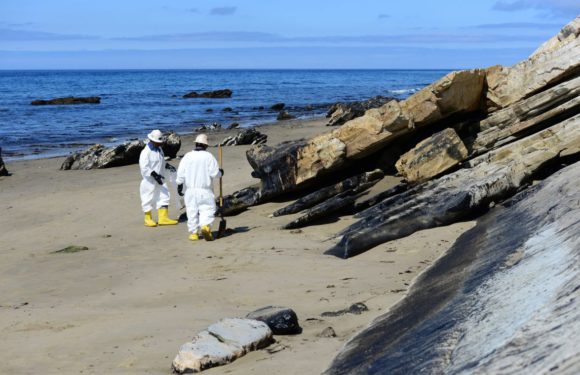An energy company whose criminal negligence caused an oil spill that soiled California beaches cannot escape liability for the damages it caused just because it is designated as a public utility, a California appellate court ruled in a split decision.
A panel of the Second District Court of Appeal on Thursday reversed a trial court decision that the California State Lands Commission and the Aspen American Insurance Co. could not collect from Plains Pipeline LP for economic damages because utilities cannot be held liable for economic damages caused by service interruptions. Justice Arthur Gilbert wrote for the majority that while California courts had ruled in 1911 that a utility cannot be sued for damages caused by cutting off a business’ water supply, that precedent doesn’t apply in this case.
“In contrast, Plains does not deliver essential municipal services to members of the general public,” the opinion says. “Its task is to transport oil to a private entity for commercial purposes. Although it is called a public utility, it is a private business, entitled to no more immunity from liability than any ordinary private business.”
Associate Justice Martin J. Tangeman dissented. He said the ruling “casts doubt on more than a century of cases holding public utilities exempt from liability for interruptions in service.”
Plains owned and operated Line 901, a 24-inch pipeline that runs about 11 miles along the coast of California. The company was licensed by the Federal Energy Regulatory Commission, which set the rates it could charge for transporting crude oil pumped from offshore platforms.
The pipeline burst on May 19, 2015 and spewed 140,000 gallons of oil that ran in culverts down to Refugio State Beach near Santa Barbara. Investigators found that the pipeline was corroded and had worn down to a thickness of 1/16th of an inch in some places. A jury found that Plains was liable for criminal negligence.
Aspen American Insurance paid the state $22 million from the bond that Plains had purchased as a condition for leasing state lands. In March, the company’s parent, Plains All American Pipeline Co., agreed to pay the state $60 million to restore natural habitat damaged by the oil spill.
Sheri Pemberton, public information officer for the State Lands Commission, said it will cost the state $350 million to $375 million to plug and abandon the oil wells that feed into the pipeline.
Plains All American in a public company that reported $143 million in net income for the third quarter of 2020 and held $24.2 billion in assets, according to a Nov. 2 earnings report.
The state Lands Commission filed a separate lawsuit against Plains in Santa Barbara County to collect for economic damages. In addition to fouling the environment, the break in the pipeline caused the state to lose income from royalties on crude oil pumped from its offshore lands, the lawsuit alleges. Aspen Insurance joined the lawsuit to protect its subrogation interest.
Veneco, an oil exploration company, had to shut down its Holly offshore oil platform after the pipeline broke. The company eventually filed for bankruptcy and ceded its property to the state. But the state continues to pay Veneco and other contractors about $1 million per month to maintain oil and gas production facilities and to gather crude that continues to ooze out of the offshore wells. Pemberton said the oil is stored in tanks for now, but those are filling up and the crude oil will eventually need to be transported to refineries.
Santa Barbara County Superior Court Judge Colleen K. Sterne ruled that Plains Pipeline could not be held liable for economic damages caused by a service interruption because it is a public utility.
The appellate panel majority, however, found that the pipeline’s owner cannot be immune from liability in a situation where it has a “special relationship” with the plaintiff. The court noted that the State Lands Commission depended on the pipeline to transport oil from offshore wells.
The panel reversed the trial court’s decision and remanded the case for further proceedings.
David C, Vies, an attorney who represented Aspen, said he is “very pleased” with the ruling, but did not have permission from his client to make any public comments.
Attorneys for Plains All American did not respond to a request for comment.
About the photo: Two cleanup crew members work to remove oil from the sand along a portion of soiled coastline near Refugio State Beach, on May 23, 2015. (Photo by U.S. Coast Guard posted online by the National Oceanic and Atmospheric Administration.)
Was this article valuable?
Here are more articles you may enjoy.


 Tesla Sued Over Crash That Trapped, Killed Massachusetts Driver
Tesla Sued Over Crash That Trapped, Killed Massachusetts Driver  China Bans Hidden Car Door Handles in World-First Safety Policy
China Bans Hidden Car Door Handles in World-First Safety Policy  LA County Told to Pause $4B in Abuse Payouts as DA Probes Fraud Claims
LA County Told to Pause $4B in Abuse Payouts as DA Probes Fraud Claims  Portugal Rolls Out $2.9 Billion Aid as Deadly Flooding Spreads
Portugal Rolls Out $2.9 Billion Aid as Deadly Flooding Spreads 